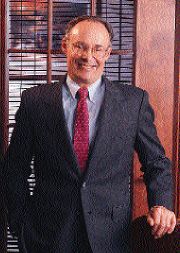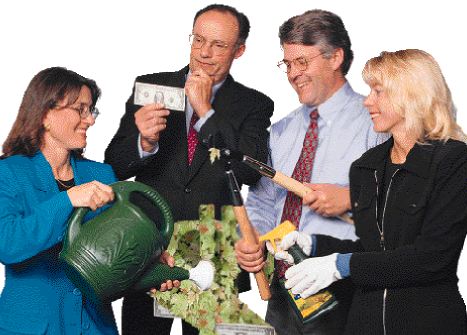 Fritz Hausmann, president of Hausmann Insurance
Fritz Hausmann, president of Hausmann Insurance
 Fritz Hausmann, president of Hausmann Insurance
Fritz Hausmann, president of Hausmann Insurance
"We have a floor, but we've removed the ceiling," Fritz Hausmann, president and managing partner at Hausmann Insurance, Madison, Wisconsin, says in describing the unique system the agency uses to remunerate all its people. Everybody at the agency has a base salary, a floor if you will, and then receives additional income based on revenue and profitability--from the receptionist to senior management.
Hausmann Insurance had its start at the end of World War II when it was founded by Phil J. Hausmann in 1946. It remained a one-man agency until 1962, when Bill Butler came on board. He had been with Continental Insurance Companies. But it was the next generation that really started the impetus toward growth.
Jeff, Phil's oldest son, joined the agency in 1972 and established an aggressive growth plan based on expanding sales. Then, a couple of years later, the middle son, Fritz, joined the agency. He had been an engineer with the Panama Canal Co. and was a graduate of West Point. In 1980, the youngest son, Tim, left Del Monte Foods Corp. to join the agency. The combination proved propitious--strong sales skills from Jeff, management expertise from Fritz, and systems and marketing expertise from Tim. Today, Jeff is chairman of the agency, Fritz is president and managing partner, and Tim is vice president.
By 1984, the agency's premium volume reached $4 million at which time Hausmann took a significant step with the purchase of Midwest Agency. Midwest was a well-established agency in the area. The acquisition not only boosted premium volume, but also added more than 100 years of insurance experience when Midwest's president, Armand Simon, and four other key employees joined Hausmann.
Today, the agency has premium volume of $45 million and 41 employees. In addition to property and casualty insurance, it also handles employee benefits, disability and life. Those latter lines of business were added in 1992 and were further enhanced with the acquisition this year of Ashworth & Associates, a specialist in benefits and health insurance. Most recently a bonding department was set up and will be headed by Steve Ryan who brings 30 years of bonding sales and underwriting experience to the firm.
We talked with Fritz about the agency's rise to become the largest independent non-brokerage agency in Dane County and one of the largest in the state--and now being honored as our Agency of the Month.
"The acquisition of Midwest Insurance Agency gave us enough volume to become a factor in the area," Fritz says. "That helped us grow and also gave us the clout to negotiate more favorable contracts with our companies and for our clients."
A few years after the acquisition, "we began experimenting with the idea of turning every area of the agency into its own profit center and rewarding every person for their efforts to bring in that profit," Fritz says. "It was not immediately accepted," he admits. "In fact, it took several years to catch on. And it wasn't just the employees who had a problem. The owners also had to accept the change. We had to open up our books to every associate. We ran the numbers (a monthly profit and loss balance sheet) for a number of years to show everyone how it would work. Today, a dozen years into the venture, it's not only accepted but there's been a complete buy-in. A new mentality has taken over, where everyone of our associates is an entrepreneur thinking about sales and ways to improve performance and service to our clients."
Each associate knows who we all work for; it's our clients. They pay our way, not Hausmann Insurance.

Freeing up top management
One of the side benefits of this new way to operate an agency is that top management does not need to get involved in the day-to-day employment problems. "Each profit center is responsible for hiring its own people. They're also responsible for deciding whether someone isn't working out," Fritz points out. "We've had more than a few instances where the people in the profit center decided when and how to downsize. It was the kind of tough decision that owners avoid making. And the kind of decision that top management usually takes too long to reach. But they're right on the line and really understand what they need to operate more efficiently. They make those decisions quickly."
So, instead of dealing with day-to-day issues, top management spends its time on other things that, they hope, will make the agency more profitable. Fritz, for example, spends his time negotiating contracts and incentives with companies. "That's pretty much my full-time job," he says, noting that he doesn't do any selling any more. "We've gone to contracts that are completely unique to our agency. And, as a result, our contingencies are very high. They represent about 14% of our income. That's extra money that goes into everyone's pocket."
Top management also has begun to look into setting up joint ventures with accounting firms and a bank. "We need to provide our clients with more related financial services and support, plus find new clients, and this is one way," Fritz notes.
Unique automation solutions
Management also has been involved in developing unique automation systems to eliminate errors internally and improve communication externally. Hausmann developed its own system of information management called DesignLynxSM. The system audits and cross-checks information about business coverages. Based on a systematic checklist of available protection options, the system allows Hausmann's associates to overlay a comprehensive coverage grid on a business's current operations to reveal gaps or possible omissions.
As Fritz notes, "The computer allows each associate to basically check and recheck specific criteria to make certain we haven't missed anything. It's the kind of tedious task that could easily result in a human missing something, but the computer doesn't get bored." Interestingly, the DesignLynxSM system has been so effective at discovering possible gaps or omissions that a national insurance company asked Hausmann to apply it to their operation. "They chose us because we were the only agency who pushed them to a 100% performance standard," Fritz says.
The other system the agency uses is called SkyLynxSM. It networks all the Hausmann people so that they all have instant access to client information.
Implementing the results of these systems is the StarClassSM system instituted by Hausmann in 1995. StarClass rates every account based on size and complexity. The level of service is delineated by the system depending on these criteria. The minute an account is written, it is entered into the agency's computer system and StarClass diaries the account for all subsequent functions. "We let clients know exactly what service to expect, by whom and when they will see us," Fritz says.
"We also conduct surveys regarding this system, our claims handling and other important aspects of our service to both educate our clients and to continually upgrade our support to our clients. If customers want a higher level of service than prescribed by the system, we have begun to offer additional services on a fee basis." In fact, he continues, providing loss control on a fee-for-service basis "will become another avenue not only to increase revenues but also to make available more services to some clients."
He points out, "The system not only makes it clear to customers what they can expect and why, but also makes life less stressful for employees. They know exactly what they're expected to do for each account.
Automation has resulted in an agency where "we can do more with fewer people. StarClass has us focus our efforts on the right accounts. By year-end," Fritz says, "we plan on becoming completely paperless. All client information, pictures and company forms will be scanned in. The company forms will be filled out on the computer and e-mailed to the companies."
A family atmosphere in an electronic world
Rather than having a chilling effect on the Hausmann Insurance world, automation has left people free to focus on what they do best. This has enhanced the family atmosphere for the human side of the organization, while the cold, impersonal machine handles the cold, impersonal chores that once had to be handled by warm-blooded beings.
"We've really developed a focused team of people who work well together and like to be together," Fritz says. "Every three to five years, we offer a one-week paid trip for employees and spouses. Who goes is based on achievement of certain goals. Where we go then becomes a group decision. Employees are offered a choice between money and the fun. This year 75% made the trip."
The agency also has monthly department meetings to keep everyone informed regarding goals/objectives and financial information. "I also give an annual State of the Agency report to all associates," says Fritz.
"Recently" he adds, "the meetings have involved showing associates not only how we are doing but more on how the market is doing and where it is headed--more competitive. Something is going to give and we want to make sure it isn't us. The industry can't keep heading in this direction."
Let's hope he's right. *
The author
Dennis Pillsbury has more than 20 years' experience in insurance journalism, both as an editor and freelance writer.
©COPYRIGHT: The Rough Notes Magazine, 1999